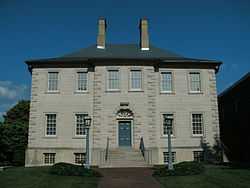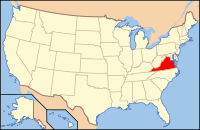Carlyle House
|
Carlyle House | |
 | |
|
The Carlyle House in 2009 | |
 | |
| Location | 121 N. Fairfax St., Alexandria, Virginia |
|---|---|
| Coordinates | 38°48′19″N 77°2′32″W / 38.80528°N 77.04222°WCoordinates: 38°48′19″N 77°2′32″W / 38.80528°N 77.04222°W |
| Area | 0 acres (0 ha) |
| Built | 1752 |
| Architectural style | Georgian |
| Governing body | Local |
| NRHP Reference # | 69000333[1] |
| VLR # | 100-0010 |
| Significant dates | |
| Added to NRHP | November 12, 1969 |
| Designated VLR | May 13, 1969[2] |
Carlyle House is a historic mansion in Alexandria, Virginia, United States, built by Scottish merchant John Carlyle in 1751-53. It is situated in the city’s Old Town on North Fairfax Street between Cameron and King Streets.
.png)
When the lots for the new town of Alexandria were auctioned in July 1749, Carlyle purchased lots 41 and 42, situated between the Potomac River and the town's market square, ideal for his merchant business. He began construction of a house in 1751, using indentured and slave labor. The home was built in mid-Georgian Palladian style with space for entertaining and private family and servant use. He also built a number of outbuildings for both household and business needs. Carlyle and his wife, Sarah née Fairfax, moved into the house on 1 August 1753, the day Sarah gave birth to Carlyle's first son, William. Carlyle is supposed to have sealed a cat within the house's walls, an old Scottish tradition to bring luck.
In 1755, the house was the initial headquarters for Major-General Edward Braddock in the Colony of Virginia during the French and Indian War. The Congress of Alexandria convened in the dining room of the house and here Braddock decided to make an expedition to Fort Duquesne which would result in his death. He was urged not to undertake the expedition by native Virginian George Washington who was then a volunteer aide-de-camp to Braddock. Braddock first suggested the idea of levying additional new taxes on the colonists to help with the cost of the war at the house.

Carlyle was a slaveholder. Carlyle’s slaves lived and worked in his Alexandria home, on three plantations and in a foundry located on the same lot as the house. When he died, there were nine slaves living at Carlyle House: Moses, Nanny, Jerry, Joe, Cate, Sibreia, Cook, Charles, and Penny.
Following Carlyle's death in 1780, his son George William Carlyle inherited the house. However, he died one year after his father at the Battle of Eutaw Springs in South Carolina. The son of John Carlyle's eldest daughter Sarah Carlyle Herbert, John Carlyle Herbert, inherited the Carlyle House in 1781. The house passed from the family's possession by 1827 when Sarah Carlyle Herbert died and John Carlyle Herbert sold it to pay off an uncle's gambling debt. He himself had moved to Maryland in the first decade of the 19th century.
In the mid-19th century, the Mansion House Hotel, which became called one of the best hotels on the East Coast, was built along Fairfax Street making Carlyle House no longer visible from the street. The hotel and the house were seized by occupying Union forces during the American Civil War.
Significant restoration work to the house was undertaken in the early and mid 1970s and the hotel (also known as the Braddock Hotel) was torn down once again exposing Carlyle House to North Fairfax Street.
Since 1970, the Carlyle House Historic Park is owned and administered by the Northern Virginia Regional Park Authority and includes the 18th century mansion and its gardens. On the National Register of Historic Places, it is architecturally unique as the only stone, 18th-century Palladian-style house in Alexandria. The "Grandest Congress" is a reenactment celebrating Gen. Braddock's time at the house that takes place every year at the Carlyle House.
References
- ↑ "National Register Information System". National Register of Historic Places. National Park Service. 2009-03-13.
- ↑ "Virginia Landmarks Register". Virginia Department of Historic Resources. Retrieved 05-12-2013.
- "About John Carlyle" at Carlyle House Historic Park website
- Information on the Carlyle House from Virginia African Heritage Program
External links
- Carlyle House Historic Park website
- Carlyle House at Alexandria Sites on the National Register of Historic Places
- John Carlyle House, 123 North Fairfax Street, Alexandria, Independent City, VA at the Historic American Buildings Survey (HABS)

